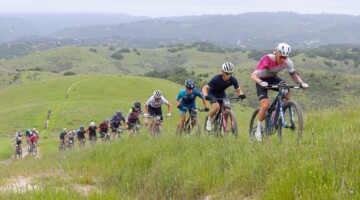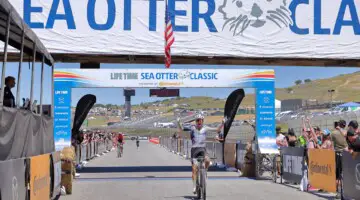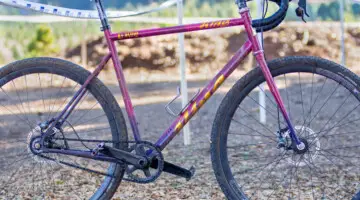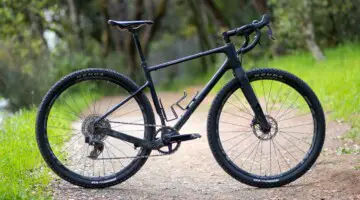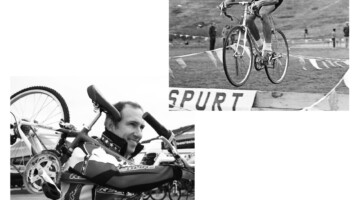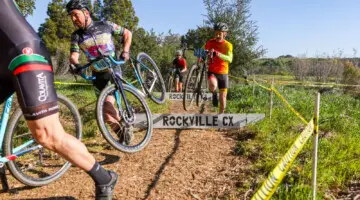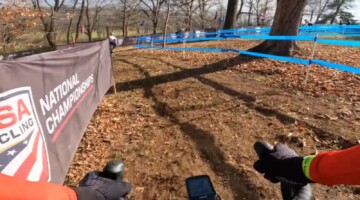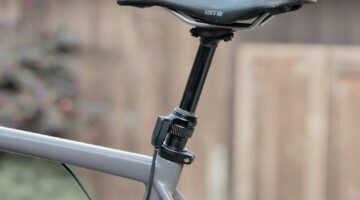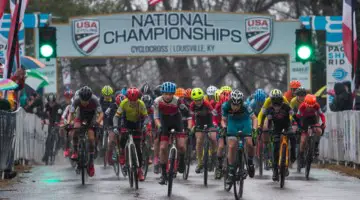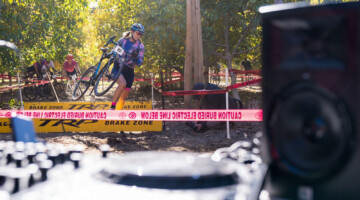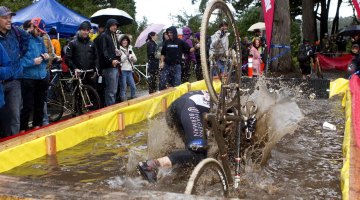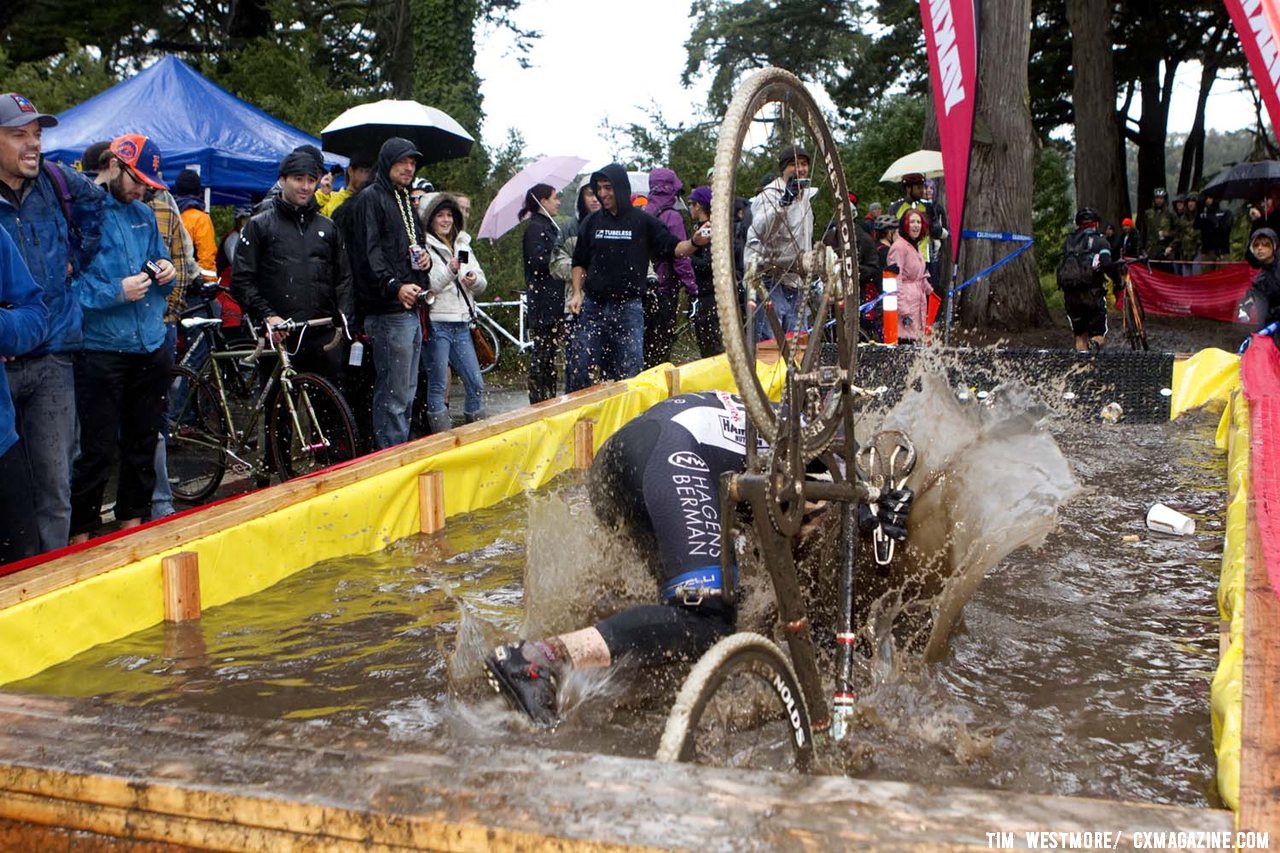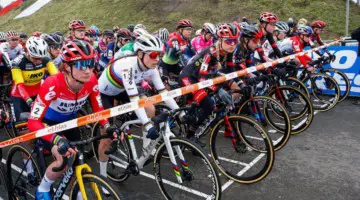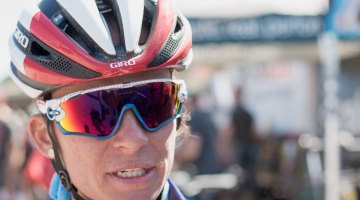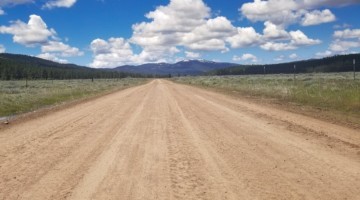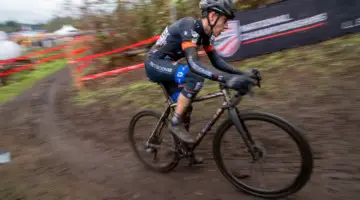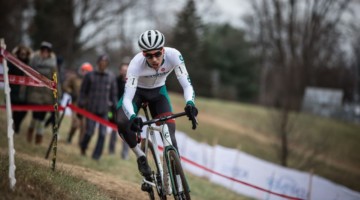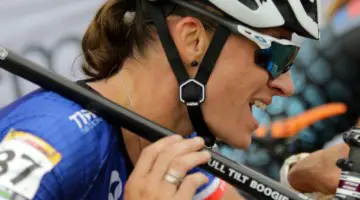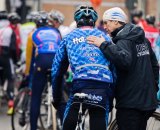
Proctor working with Yannick Eckmann at EuroCrossCamp last Christmas. Photo courtesy of Geoff Proctor
Geoff Proctor truly is a Jack of all trades: not only does he manage to stay involved in cyclocross at nearly every level, from Junior development to running camps to sitting on the UCI commission to racing, but he also manages a full-time job as an English teacher teaching AP Lit. And he’s responsible for EuroCrossCamp, a hugely successful venture that is now in its ninth year. EuroCrossCamp, for those who haven’t heard of it, has given up-and-coming riders from the US a chance to live the life of the pros for the week between Christmas and New Year’s, focusing only on riding, racing and gaining the experience that will put them on the top of the World’s podiums.
That he had time at all to sit down and answer a few questions for us was amazing, especially since he just finished running his USAC Cyclocross Development summer camp for Junior racers. To see how the camp was run in Proctor’s own words and get a sneak peak at some of the up-and-coming talent this year, you can read the article and see the gallery here.
Cyclocross Magazine: What’s in store for your winter camp this year? Planning anything new and exciting?
Geoff Proctor: This will be the ninth year of EuroCrossCamp. Every year, the Camp delivers on the same goals: preparation for the World Championships and development through international race experience. This year I’m pretty excited because it marks a return to a race program that was prevalent in the early years of the Camp: specifically, two full weeks of racing. Last year, I held a team practice race mid-week the first week because there were no races. Now we’ve got two busy weeks with an excellent range of races to choose from.
Tentative EuroCrossCamp Program 2011
- 17 Dec Essen GVA
- 17 Dec Lichtervelde
- 18 Dec Namur WC (Junior Race is not a WC)
- 18 Dec Maldegem
- 20 Dec Surhuisterveen, NED
- 23 Dec Diegem SP (UCI Junior)
- 25 Dec Balegem
- 26 Dec Zolder WC (Junior Race is not a WC)
- 26 Dec Beernem
- 28 Dec Loenhout GVA
- 29 Dec Bredene
- 30 Dec Tervuren
- 1 Jan Baal GVA
CXM: Why is it important for young Americans to get that Euro experience with your camp?
GP: I’m a real advocate for young riders to compete against their peers in their age group. The problem I see is, in the US, due to smaller, less competitive, but age-appropriate fields, our stronger young riders are often racing above their age. This works for awhile because there’s no pressure, and they really can’t be faulted. Young aspiring riders always love a challenge. But it does cause some overreaching. The reality is, when they get to Europe, there are 100 kids their own age in the same race who are all fast. Depending on how they perform, their morale can take a hit. But it’s a key step in the process. If a young rider aspires to the highest levels in bike racing, he or she needs to incorporate blocks of European racing.
So, to answer your question, I feel it’s really important to get our top kids over to Europe racing against really strong competition in their own age group. That’s the principle behind EuroCrossCamp and it’s something I’m dedicated to facilitating.
CXM: What’s the best thing that’s come out of hosting this camp, for you?
GP: Strong relationships with the Camp riders and building the ethic amongst these riders that the European experience makes you a stronger rider. When I see Jamey Driscoll, Barry Wicks, Jeremy Powers, Ryan Trebon, Danny Summerhill, Bjorn Selander, Yannick Eckmann and so many others — you can go right down the line — there’s an unsaid connection we have, having done Christmases together in the trenches of Euro cyclocross. It’s something special.
CXM: We had a few logistical questions about the camp: how do you choose riders? How is it funded? What is the average age of the riders at the camp?
GP: I base EuroCrossCamp selection on domestic UCI races from the beginning of October to mid-November. I also pay attention to riders’ regional/local results if they are unable to travel much. I also try to include the first USAC Worlds selection races which are usually mid-November. European organizers prefer to have names and numbers sooner than that, but realistically, I can’t select until I see how the riders are going.
The Camp is a pay-to-play situation. I’m always on the lookout for financial support and some years, I’ve been able to help out some riders.
I’m not sure of the average age, but my objective is to take mostly Juniors and U23s with a few Elite riders mixed in to help with the role modeling.
CXM: What about your new summer program in Montana: how did you come to choose Montana, and how are you planning on running it exactly? (For example, it’ll be dry and hot there, most likely: How will you get them prepped for cold and muddy conditions?)
GP: Marc Gullickson (USAC) and I are keen to continue to build the US cyclocross program. For years, I’ve discussed with Rudy De Bie (Belgian MTB/cyclocross director) and some of the other federations about what sort of cyclocross-specific training camps they’re doing in the summer. Finally, this summer, with support from USAC, it’s become a reality.
For this first year, I wanted to have the summer camp take place where I live — Helena, MT — to make our training more productive. Part of the character of the camp is to do focused training in a refreshing mountain environment. We have a great cyclocross training circuit in the foothills above Helena and we have access to equipment, facilities and training rides in and around the Continental Divide that will make for a great camp. Part of my objective is to expose these guys to lots of different ways and exercises to make them stronger cyclocross riders.
We’ll do conditioning training early morning; cyclocross training late morning; training rides in the afternoons; and classroom, mental training and video sessions in the evening. Full days for sure!
We won’t be able to mimic the adverse weather conditions of cyclocross, but that’s OK. It’s all about the big picture and laying the groundwork for a successful cyclocross future.
Finally, I want to stress that this camp is not a selection or performance camp. All riders still have to earn their way towards selection to World Cups and the World Championships via strong results. This camp simply brings together some (but not all) of the top 15-17 year old male cyclocross racers to establish some training, preparation, and planning guidelines.
CXM: How is your cyclocross camp and race schedule different now that US Nats are moved to January in Madison?
GP: I’ve been asked this question quite a bit recently. Honestly, the Camp remains committed to offering riders the opportunity to be racing in Europe during the busy Christmas race period. I respect the riders and their preparation for Worlds and now Nationals. If riders respond well to a hard European racing block and the travel, then they will be very well prepared for Nationals after attending EuroCrossCamp. If riders respond better by staying home and training, then I respect that too.
In the end, it’s all about developing and representing.
CXM: When and how did you get into cycling and coaching? Did you start as a racer or as a coach?
GP: I came to bike racing from alpine ski racing. A lot of our dry land training for ski racing was on the bike. I raced cyclocross in Europe (mostly Switzerland) and raced three World Championships during the 1990’s. But all of it was with an eye towards helping those with more talent one day.
CXM: How have those jobs evolved?
GP: I really enjoy working with Marc Gullickson and the great staff at USAC. I also work well with the riders and their coaches, both domestic and European organizers, officials and commissaries, and the UCI. I’ve been managing our athletes at Cyclocross Worlds for many years now. It’s been super to have a front-row seat throughout this evolution.
CXM: You wear many different “hats”: our rep to the UCI cyclocross commission, you run the Euro cyclocross camp, and you do some racing yourself. What are your official titles exactly? Is one job most important to you?
- Jr/U23 Coach/Manager, USA Cyclocross
- Member, UCI Cyclocross Commission
- Director, EuroCrossCamp
- Director, USAC Cyclocross Summer Development Camp
- Coach, USAC 15, 16 Summer Road Program (2007, 2009)
- Level 1 Coach, USAC
- Co-Director, Helena Dynamos Youth Cycling Team
- Racer (Road C2; MTB C1; CX C1)
As mentioned above, for me, now, it’s all about developing and representing. Development is extremely rewarding. I’m very impressed with what’s coming out of our clubs and camps and teams these days. With everyone working together and learning from each other, we’re getting stronger and stronger in all cycling disciplines.
CXM: In that same vein, how do you balance those jobs? Do they overlap at all?
GP: There’s often significant overlap, but I try to compartmentalize and play the overlap to our advantage. Last Thanksgiving, we had a UCI Commission meeting in conjunction with the Koksijde World Cup. I was in Commission meetings for part of the trip and then worked with our riders for the race. Overall, it’s a challenging balancing act, mainly because my family is most important to me and my real job as a teacher is very demanding.
CXM: Do your students know about your “other life”?
GP: Yes, I teach senior AP Literature, junior AP Language and Creative Writing. As I mentioned, it’s hard at times (especially the reading of student essays), but I love the students and the material. The point where my teaching work intersects most with my cycling life has been when I share with my students my process in writing a book about the pulse and character of pro European cyclocross (The manuscript is done; now trying to find publisher). Sharing with them all the stages of this project has helped me to impart the principles of the writing process.
CXM: In your opinion, is USA Cycling investing enough (time and money) in cyclocross, and specifically, in Junior cyclocross?
GP: I think it’s getting better. We still have a long ways to go, but as evidenced by this summer development camp, we’re working to get there.
CXM: We have to ask: what’s your favorite part of the sport?
GP: Working with young riders and seeing them progress. Seeing them commit to something, learn how to be serious about it, be ambitious about it, and go after it. Being a part of that process, especially the European component of that equation where they are truly challenged; that’s as good as it gets.

